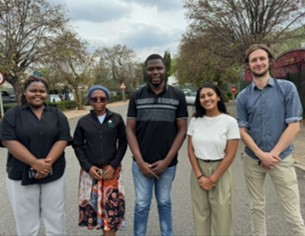In their own words: A personnel exchange between African tax data labs is a small but important example of the value of cooperation
In recent years, UNU-WIDER has partnered with sub-Saharan African governments to establish secure data labs that provide researchers with access to anonymized administrative tax data for economic research. Two notable examples are the Uganda Revenue Authority (URA) research lab in Uganda and South Africa’s National Treasury Secure Data Facility (NT-SDF), developed through collaboration with the SA-TIED programme. These secure facilities represent pioneering efforts to transform how researchers and policymakers address pressing development challenges.
The success of these facilities relies on more than technical infrastructure. Their long-term sustainability depends on skilled professionals, collaborative networks, and the sharing of best practices. SA-TIED and URA, with support from UNU-WIDER, launched a pilot Research Assistant Exchange Programme in 2024, part of a broader goal to foster peer-to-peer learning and develop local capacity. The programme brought together research assistants from Uganda and South Africa to exchange insights, develop technical skills, and explore opportunities for strengthening institutional research capabilities. One of us traveled to Uganda, while the other visited South Africa for two weeks. We immersed ourselves in each country’s research facility and gained insights into their respective operational and strategic approaches. This experience gave us a deeper understanding of the unique challenges and opportunities in each setting, particularly about how to enhance the effectiveness of ongoing research efforts.
Expanding local engagement
Some key takeaways were the importance of expanding local engagement and fostering collaborative partnerships to strengthen research. For both programmes, increasing the pool of local researchers presents an opportunity to create an environment where more diverse perspectives can drive innovation. Actively involving local researchers ensures that research is more strongly aligned with the local context, making it more relevant and impactful. To increase local participation, the programme teams are conducting road shows at local universities to raise awareness about the data labs and the opportunities for researchers to engage with real-world policy issues. Although our role may not directly involve long-term relationship-building, we recognize the importance of these outreach efforts. Moving forward, we hope for a more inclusive research ecosystem that attracts local researchers and enhances the quality and policy relevance of research.
The value of partnerships
Throughout the exchange, we also gained firsthand experience of how effective collaboration and partnerships are in advancing the research agenda. The integration of both internal stakeholders (such as different departments within an institution) and external collaborators (like universities, think tanks, and other research bodies) is essential to improving the sustainability of research initiatives. In South Africa, the collaboration between National Treasury, the South African Revenue Service, and UNU-WIDER has been beneficial in streamlining workflows, improving access to data, and ensuring that research outputs are more closely aligned with policy needs. This model offers lessons for other countries and programmes looking to enhance the efficiency and impact of their research initiatives.¨
Strengthening research with tools and best practices

In parallel, our engagement with different researchers reinforced the importance of practices like dummy datasets and structured workflows, which are central to enhancing research capacity and ensuring efficient data management. Dummy datasets, recently introduced in South Africa, allow researchers to test methodologies without handling sensitive data, ensuring compliance with data protection standards while maintaining the integrity of research practice. For Uganda, the introduction of dummy datasets presents an exciting opportunity to further develop the research lab's capabilities.We also gained a deeper appreciation for the importance of structured workflows, which are supported by templates, documentation, and tracking systems. Moving forward, we see opportunities to integrate these practices into our workflows, particularly by supporting methodology testing with dummy datasets and helping to adopt structured workflows that will keep research organized, minimize errors, and streamline complex processes.In addition to dummy datasets and structured workflows, thorough data descriptions improve how research data is processed.
In some instances, researchers relied on technical notes—written explanations of the data—rather than standardized methods to organize and label it. This can sometimes lead to inefficiencies, particularly when developing analytical tools. By adopting clearer, more structured approaches to describing and organizing data, researchers can make the data easier to navigate. Our discussions and learnings also touched on the role of data-related legislation and governance, highlighting the need for ethical practices to ensure responsible data handling.
We also looked into the importance of informed consent for data access and use, along with transparency in sharing data across institutions, which fosters trust while ensuring compliance with legal and ethical standards. As we returned to our respective countries, we left with a renewed understanding of the value of collaboration in research. This exchange was a reminder that building strong research environments doesn’t happen overnight—it requires continuous learning, sharing, and adapting. We are eager to take the lessons we've learned back to our work.
The views expressed in this piece are those of the author(s), and do not necessarily reflect the views of the Institute or the United Nations University, nor the programme/project donors.



